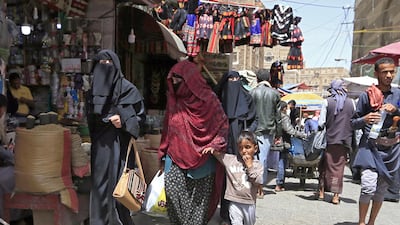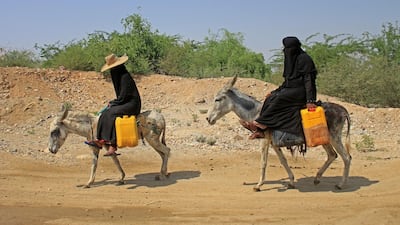Senior officials from US President Joe Biden's administration on Tuesday warned of stark funding shortfalls for aid work in Yemen, where fighting in the Marib region and elsewhere has pushed millions towards poverty and famine.
Samantha Power, the administrator of USAID, and US envoy to Yemen Tim Lenderking told an online briefing that the UN’s 2021 appeal for $3.85 billion for Yemen had only been half funded and urged donors to dig into their pockets.
About 80 per cent of Yemen’s population — some 24 million people — need aid seven years after the Iran-backed Houthi rebels seized the Yemeni capital Sanaa, leading to a war to restore the ousted government that drew in Saudi Arabia and other neighbours.
“The Yemen humanitarian response is less than 50 per cent funded,” said Mr Lenderking.
“If we cannot mobilise additional funding, we will see more Yemenis die when they could have been saved, and we will further restrict the space for building peace in the country.”
Ms Power said that life-saving programmes to deliver food, fuel and medicine to millions of Yemenis in Houthi- and government-held parts of the fractured country will “have to be scaled back” unless new funding sources are found.
“All of us are also trying to be really creative about how we bring private citizens into this cause — the private sector, non-traditional donors who have tended to leave Yemen to the US, the European Union and some of the Gulf donors,” said Ms Power.
“We need all hands on deck.”
The war started in 2014 when the Houthis invaded Sanaa and removed the government of President Abdrabu Mansur Hadi. A coalition led by Saudi Arabia and others intervened in March 2015 to restore Mr Hadi to power but the ensuing conflict, now stalemated, has killed some 250,000 people and caused the world's worst humanitarian crisis.
Military action has in recent months been concentrated in the gas-rich Marib region, where Houthi rebels have been trying to take the government’s last stronghold in the north of the country in an offensive that has largely ground to a halt.
Mr Lenderking described “new momentum” to broker a deal between the Houthis and Yemen’s toppled government and urged the country’s warring forces to return to the negotiating table and hammer out a ceasefire plan.
“There's a lot of support for more inclusive peace efforts that build on the strong demand inside of Yemen for peace and opposition to the costly, stalemated offensive in Marib,” said Mr Lenderking.
“We can't ignore the fact that the erosion of the economy and basic services continues to drive the humanitarian crisis throughout Yemen.”









